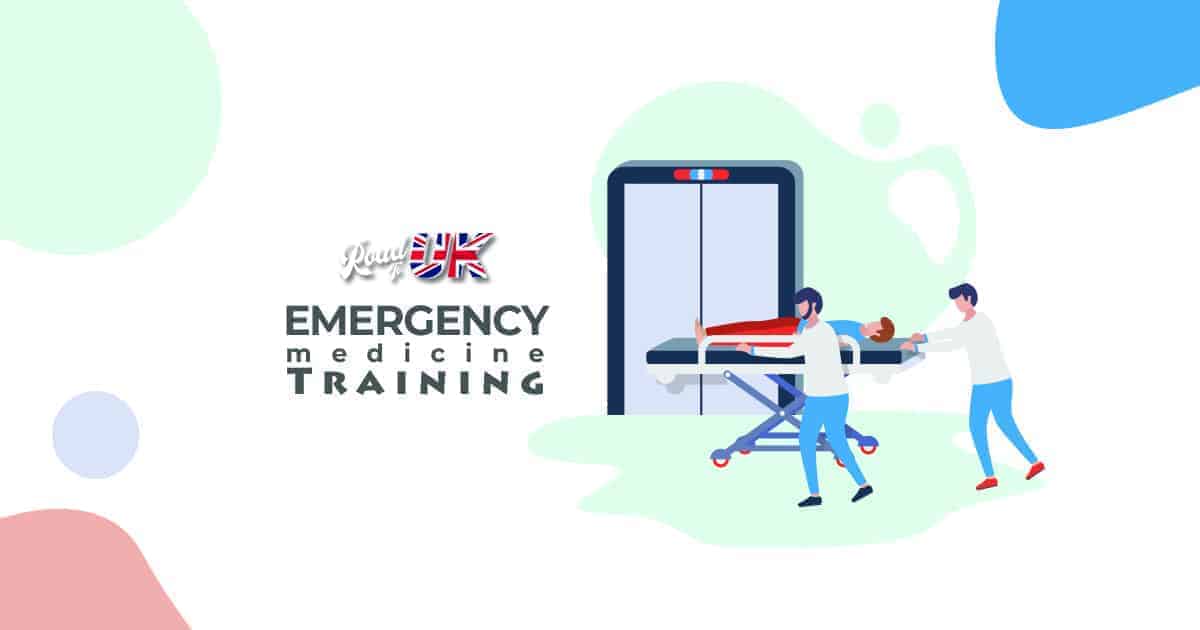Emergency Medicine Training in the UK

Emergency Medicine is a specialty in which doctors use their knowledge and skills to recognise and treat the acute, urgent, and emergency aspects of illness and injury affecting patients of all age groups.
A lot of international medical graduates (IMGs) working in the UK are interested to know how the training in emergency medicine is structured and what are the opportunities to work in this field. Royal College of Emergency Medicine (RCEM) is the body who maintains the training, and their website would be the primary source of information and guidelines.
Related Sub-specialties
The pathways to obtain Certificate of Completion of Training (CCT) in emergency medicine in the UK, is not as straight forward as many medical specialties. Before we go into the in-depth discussion, I would like to mention the following sub-specialties which are related to the main EM training.
- Paediatric Emergency Medicine
- Pre-hospital Emergency Medicine
- Intensive Care Medicine (Dual accreditation along with EM)
There are a number of other recently developed (and developing) options for special interests that can be included in emergency medicine training. These include
- Academic EM,
- Geriatric EM,
- Ambulatory Care and and a number of other allied specialties.
Some Emergency Physicians also work as General Practitioners or have an interest in almost anything you can think of, including Toxicology, Infectious Diseases, Sexual Health, Wilderness Medicine, Retrieval Medicine… the list goes on and on!
Let’s have some look at the statistics
The statistics below are for the Round 1 competition ratios for the CT1/ST1 specialties. We can clearly see a few important points:

- The number of available posts for training in ACCS -EM (The CT1/ST1 equivalent for EM training) is very small compared to other specialties like GP, internal medicine training, and even core surgical training. This small number makes this training competitive.
- Additionally, 99.68% posts were accepted in 2023, which means the acceptance rate is very high among doctors who were offered training.

Pathway of Emergency Medicine training in the UK
Depending on your level of clinical work experience before, Emergency Medicine (EM) training offers you entry into the training pathway at three levels:
- ACCS-EM (3 years)
- DRE-EM (start from ST3 to ST6)
- Higher Specialty Training (ST4-ST6) (if you have obtained equivalent competencies of lower level trainnig already)
Acute Care Common Stem (ACCS) – EM
Acute Care Common Stem (ACCS) is a core level training programme. ACCS-EM is the only core training programme for trainees wishing to enter higher specialty training in Emergency Medicine in the UK.
It is a three-year programme (CT1 – 3). The first two years are spent rotating through Emergency Medicine (EM), Acute Internal Medicine (AIM), Anaesthetics and Intensive Care Medicine (ICM). The third-year is spent providing training that will ensure the trainee meets the minimum requirements for entry into Emergency Medicine Specialty Training at ST4 level.
The expected duration of this training programme is three years subject to satisfactory progression. The actual duration may depend on the circumstances of individual trainees. In 2020 applicants have the opportunity to accept a post as a run through training (RTT) post or a core training post. That means, if the trainee choose an RTT post – the progression to Higher training of EM is streamlined where in the other case they have the option to choose something different if they want to.
Run-through Training (RTT)
As we all know the specialties are mainly divided into uncoupled and run-through on the basis of how the higher specialty training follows the core level training – for EM a trainee has the option to choose.
If they choose to be on a RTT pathway they begin at ST1 (ACCS-EM) and continue, dependent on satisfactory ARCPs (yearly evaluation) , to ST6 without the need to re-apply for Higher Specialty Training (ST4-6).
If they choose otherwise (choose ACCS-EM to be a core training only), then they will have to go through recruitment again for HST. Some might prefer this over RTT, as they have the option to change their specialty after finishing their core level training to keep their options open.
Core Training
ACCS-EM is the core training for Emergency Medicine.
Read in detail about ACCS from the official documentation – ACCS website.
Direct Route of Entry to EM (DRE-EM) & EM ST3
DRE-EM is an entry point to ST3 for trainees who have a background in Core Surgical Training or a background in non-training posts in Emergency Depts .
We have written an article regarding this – DRE-EM for Emergency Medicine.
Higher Specialty Training
Higher Specialty Training in Emergency Medicine (EM) is the years ST4 to ST6. Trainees at this level assume the EM Registrar posts and work their way to become a consultant.
In order to apply for HST at ST4 level, you need to:
- Completed MRCEM (before 2018) or have FRCEM Intermediate certificate by the time of appointment.
- Evidence of achievement of foundation competencies.
- Have evidence of achievement of ACCS-EM or equivalent competencies by working in the relevant fields.
Find more info at Person Specification of ST4 EM here.
Sub-Specialty Training
As mentioned already above, the related sub-specialties to the main EM training are:
- Paediatric EM
- Pre-hospital EM
- Intensive Care Medicine
During your higher specialty training (HST) if you are interested in any of these sub-speciaities then you can choose to take these routes.
PEM (Paediatric Emergency Medicine) will be an extra 12 months of training during your HST in order to gain a sub-specialty accreditation with your EM CCT. Six months Paeds/PEM training is part of the EM curriculum during the CT/ST3 year. This six months training cannot count towards the twelve months training at sub-specialty level.
PHEM (Pre-Hospital Emergency Medicine) is a new sub-specialty area of medical practice focusing on the specialist provision of on-scene and in-transit critical care. Unlike paediatric EM, PHEM doesn’t extend your EM training rather the trainees take a blended training (mixing base specialty with PHEM training) which most closely reflects future working patterns and gives trainees sufficient time to consolidate information.

Intensive Care Medicine (ICM) is a specialty in it’s own right which is available for EM trainees to specialize in as well. Unlike PEM and PHEM, which are sub-specialties – ICM is it’s own specialty – thus you have to take the training in ICM to obtain dual CCT in EM and ICM. This in terms will make the entire training longer by 2 or 2.5 years. More official info about dual CCTs in ICM and EM can be found here.
FRCEM Examination
Fellowship of Royal College of Emergency Medicine (FRCEM) is one of the pre-requisite to complete your EM training in the UK successfully. The different components of this fellowship exam are divided into various stages of your training – which will be highlighted in the infographic below.
The Fellowship examination consists of the following components:
- FRCEM Primary Examination
- FRCEM Intermediate Certificate:
- Short Answer Question Paper
- Situational Judgement Paper
- FRCEM Final Examination:
- Critical Appraisal (Short Answer Question Paper)
- Quality Improvement Project (QIP)
- Clinical Short Answer Question Paper
- Objective Structured Clinical Examination (OSCE)
Previously (circa 2012) there was a separate Membership Examination (MRCEM) with three parts (A,B,C). But that has been absolved into the fellowship examination. You can obtain a Membership of the Royal College of EM is you have done any of the below:
- FRCEM Primary (or MRCEM Part A between 1 August 2012 and 1 August 2016 or granted exemption)
- FRCEM Intermediate SAQ (or MRCEM Part B between 1 August 2012 and 1 August 2016)
- MRCEM OSCE (previously called Part C. Passed after 1 August 2012)
Info-graphic on Emergency Medicine Training in the UK

How can an International Medical Graduate (IMG) join EM training?
Obtain GMC registration with a license to practice
Before joining any approved training programme in the UK, you have to have GMC registration with a license to practice first.
Please read this article on order to know which pathway to choose for GMC registration – How to get registered with GMC (UK).
Getting the CREST form signed
If you already have obtained Full GMC registration, the next step for you to be eligible to apply for ACCS-EM (CT1/ST1) level training is to obtain equivalent Foundation Competencies. There is a form called Certificate of Readiness to Enter Specialty Training (CREST) which serves the purpose.
Gaining experience in working in Emergency Medicine
Taking a trust grade job (non-training job) in Emergency Medicine is always a good idea if you want to make a career out of it in the long term. You can aim to get your CREST form signed working there as well as gain enough experience to build a solid portfolio for your training application.
Read our experience about – Working in Accidents & Emergency (A&E) in the NHS as a junior doctor.
Apply for training when the rounds open
Training applications happen in rounds and in order to effectively plan, you need to know when this rounds open. Like all other specialty training, the process is entirely online and the posts are advertised in ORIEL and applied through that system as well.
To know about the recruitment timeline please keep an eye on the responsible deaneries websites:
- ACCS-EM, the recruitment is co-ordinated by the London Postgraduate Medical and Dental Education.
- ST3 DRE-EM, it is handled by Health Education of Yorkshire & Humber.
- Higher Specialty Training (ST4). it is also Health Education of Yorkshire & Humber
SAS (Specialist & Associate Specialist) Grade
The term ‘SAS doctor’ includes staff grade, associate specialist and specialty doctors with at least four years of postgraduate training, two of which are in a relevant specialty.
Now-a-days all of these grade are termed as Specialty Doctor which are non-training posts which usually offer the opportunity to focus predominantly on providing direct patient care and less on the other clinical and non-clinical responsibilities required of a consultant or trainee . Many doctors choose this role as a long term or short term option and work their way for specialist registration via CESR or CESR-CP.
Specialist Registration via CESR or CESR-SP
If you want to get GMC registration as a specialist without having to go through a GMC-approved training programme your pathways can include obtaining CESR (Certificate of eligibility of Specialist Registration) or CESR-CP (Combined Programme).
Rules of CCT, CESR and CESR-CP are changing and thus the best place to track the current rule is the official Royal College Website.

